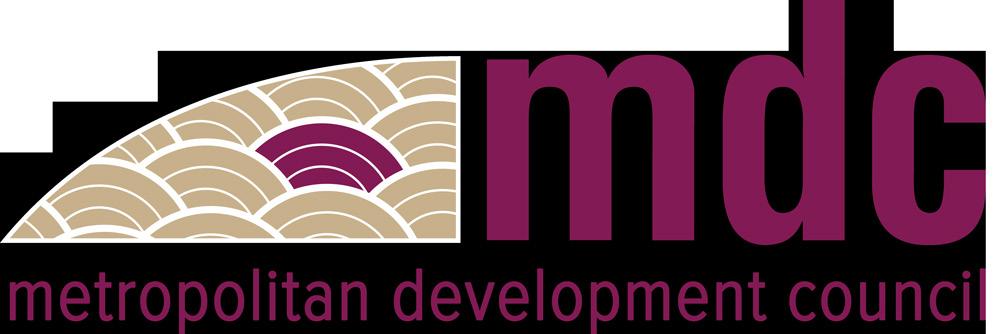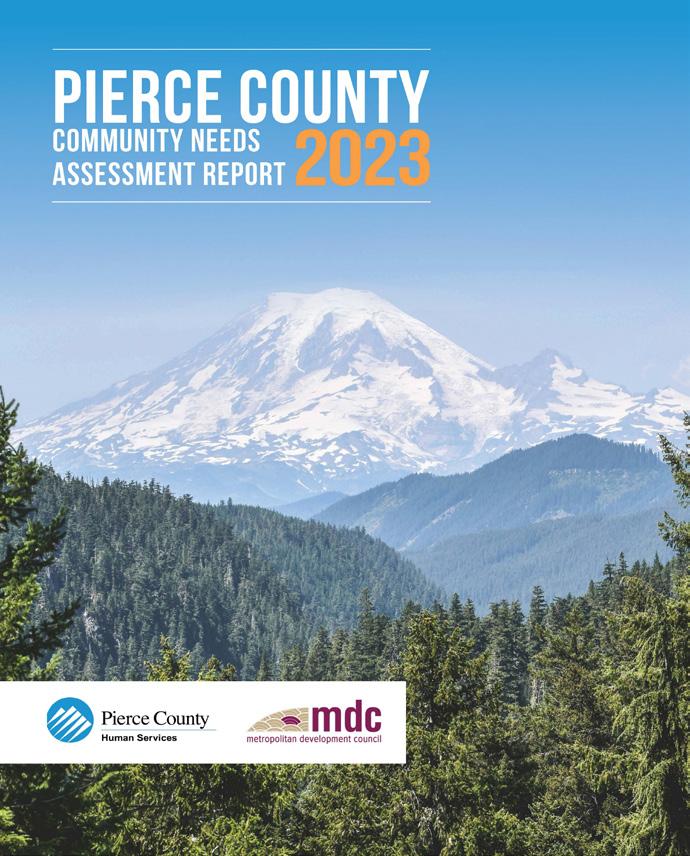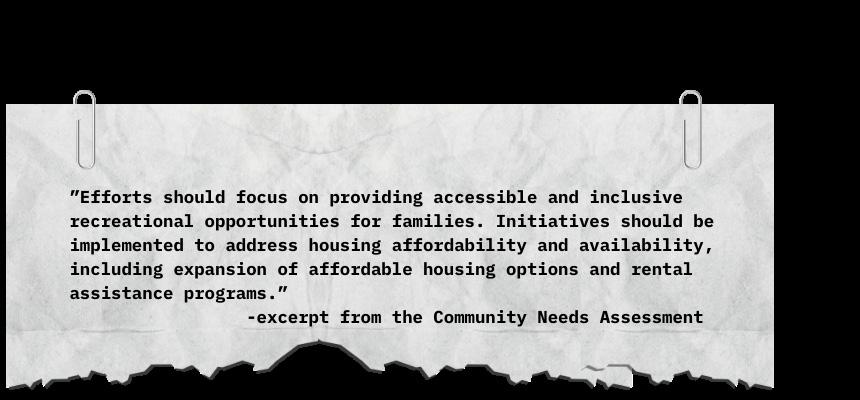




Metropolitan Development Council (MDC) and Pierce County Human Services 2025 Report

The collaboration between Metropolitan Development Council (MDC) and Pierce County Human Services (PCHS) has embarked on a transformative journey aimed at enhancing community collaboration to support and promote upward mobility among underrepresented populations in Pierce County. This report delves into the comprehensive strategies and key initiatives that have been employed to address systemic barriers to economic justice, facilitate meaningful community engagement, and foster an environment where every community member is valued and empowered.
Aligned with the Urban Institute’s Upward Mobility Framework, our project focuses on three critical areas: economic success, power and autonomy, and being valued in the community. These areas form the bedrock of our approach, guiding our actions and shaping our outcomes. Through a series of targeted support measures across various domains of well-being, this collaboration seeks to create lasting change that not only addresses immediate
These initiatives have not only provided immediate benefits but have also facilitated deeper community connections and enhanced our understanding of what our community service needs to be for those in need.
The Community Needs Assessment (CNA) conducted as part of this project has been instrumental in identifying the pressing needs of the community, with childcare emerging as a top priority. This assessment has guided our resource allocation and program development, ensuring that our actions are data-driven and community-focused.
Furthermore, our focus group and workshop insights have revealed valuable information on the community’s perceptions and expectations, which have been critical in refining our approach and enhancing our engagement strategies. The lessons learned from these engagements emphasize the importance of continued advocacy, the need for sustainable funding, and the challenges of overcoming inequitable power dynamics.
needs but also lays the groundwork for sustained economic and social well-being.
Our key initiatives have included comprehensive assessment and goal setting, skill building and education, resource navigation, employment support, financial assistance programs, robust data collection and analysis, social capital building, and family-driven advocacy and policy initiatives. Each of these initiatives is designed to empower families and individuals by providing them with the tools and resources necessary to achieve self-sufficiency and advocate for systemic change.
Significant achievements have been made through community-focused events such as the impactful diaper distribution event and through educational programs like the Allyship Training provided by Service Never Sleeps and a 10-week training program on Guaranteed Basic Income (GBI) in collaboration with Counties Advancing Guaranteed Basic Income.
As we continue to navigate the complexities of this work, our commitment remains steadfast—to empower, engage, and elevate the communities we serve. This report outlines our journey, celebrates our successes, and sets the stage for future initiatives that will continue to build on the strong foundation laid by this collaboration.
The partnership between MDC and Pierce County Human Services stands as an example of community collaboration and upward mobility support.


The partnership between the Metropolitan Development Council (MDC) and Pierce County Human Services (PCHS) epitomizes a strategic collaboration aimed at tackling the multifaceted challenges associated with poverty and limited economic mobility in Pierce County. This alliance harnesses a unique blend of resources and expertise, directing them towards comprehensive and transformative community development initiatives. The primary objective of this collaboration is to enhance the well-being and economic prospects of the community’s most vulnerable groups, facilitating pathways out of poverty and creating a framework for sustainable economic empowerment. This report delves into the various collaborative efforts, strategies, and programs implemented to uplift and support these populations, documenting the progress made and the lessons learned through this partnership.


This project represents a synergy between MDC and PCHS, leveraging their combined strengths to institute significant, lasting changes within the community. The initiatives launched as part of this collaboration are carefully designed to address systemic barriers to economic mobility and to foster an environment where all community members have the opportunity to flourish. By focusing on eliminating these barriers, the partnership aims to provide equitable access to resources and opportunities, thereby enabling residents to achieve their full potential. The strategic initiatives encompass a broad spectrum of activities, from direct financial assistance to educational programs and systemic advocacy, all tailored to meet the specific needs of the community and to catalyze profound social and economic improvements.
Utilizing the Bridge to Self-Sufficiency model, our partnership has implemented comprehensive assessments to understand the unique challenges and needs of each family. These assessments are the first step in a broader process of setting personalized, achievable goals for economic and personal development. By tailoring interventions to fit individual circumstances, we ensure that support is both relevant and impactful, paving the way for significant and measurable improvements in the lives of participants.
Recognizing the critical role of education and skill development in economic empowerment, a series of workshops and training sessions have been developed. These programs are designed to enhance essential life and employment skills, promoting autonomy and equipping community members with the tools they need to succeed in today’s economy. Topics covered include financial literacy, digital skills, job readiness, and entrepreneurial skills, all aimed at boosting participants’ employability and economic independence.

Strategic partnerships with local businesses and employment agencies have been formed to connect underemployed individuals with meaningful job opportunities. This initiative focuses on creating employment pathways that match the skills and aspirations of participants with the needs of local employers, facilitating economic success through
To ensure that families have access to necessary resources, we have enhanced our support systems to help them navigate the complex landscape of social services. This initiative involves connecting individuals with crucial resources such as healthcare, affordable housing, childcare, and food security programs. By acting as a bridge between families and service providers, we facilitate easier access to support, which is integral to their stability and growth.
In response to the fluctuating economic landscape, especially exacerbated by recent global events, we have developed programs to inform and facilitate access to various government and non-government financial assistance options. These programs aim to provide temporary relief to families facing financial hardship, ensuring they have the means to stabilize their financial situations during critical times.


A robust framework for data collection and analysis has been established to monitor the effectiveness of each initiative. This systematic approach allows us to measure outcomes, evaluate success, and adapt strategies in real-time to maximize impact. The data collected also serves as a valuable resource for reporting to stakeholders and for securing ongoing funding and support.
To strengthen the fabric of the community, we have organized numerous events and support groups that foster a sense of belonging and mutual support among participants. These activities not only enhance participants’ social networks but also build community resilience and collective efficacy, which are vital for sustainable community development.
We empower families to take an active role in advocating for systemic changes that impact their economic and social well-being. Through training programs and workshops, participants learn about policy-making processes and develop the skills needed to effectively advocate for policies that foster economic justice and community well-being.
These expanded sections provide a comprehensive view of the strategic efforts and the breadth of initiatives undertaken by the partnership between MDC and PCHS, highlighting the depth of their commitment to fostering economic mobility and enhancing community well-being in Pierce County.


The Pierce County Community Needs Assessment (CNA) was conducted between October and December 2023 by Zibolsky Consulting, LLC. The survey aimed to capture a broad perspective of community needs and was administered in multiple languages through SurveyMonkey, with paper versions also available. A total of 2,513 responses were collected with a 58% completion rate. Focus group discussions complemented the survey, involving 14 participants across four sessions, held both inperson and via Microsoft Teams.
The methodology blended quantitative and qualitative approaches. The data was collected through community surveys distributed electronically and via paper by local service providers, advertised through social media and other online platforms. Additionally, the community focus groups were aimed at gathering direct input from community members in more intimate settings, although the qualitative data from these groups did not directly enter the analysis but enriched the context with direct quotes used throughout the report.
The CNA identified childcare as the top community need among respondents. This need along with others identified will inform resource allocation, program development, and service delivery, enhancing collaboration and increasing community engagement. The insights gathered are intended to guide organizations within Pierce County to address community needs more comprehensively.






56.56%

55.08%

There is a significant demand within Tacoma for more accessible and inclusive recreational opportunities for families. This need underscores the importance of social infrastructure that supports community bonding and active lifestyles.
Then you get evicted because you have mental health issues, trauma and PTSD, which sometimes causes unsavory behaviors.”
- CNA Focus Group Participant
Behavioral health services, including mental health counseling and support, are critically needed in Tacoma. Respondents have highlighted challenges such as long wait times for appointments and a shortage of available providers, which exacerbate access issues.


Many respondents within Tacoma have identified a pressing need for financial support, especially concerning energy bills, rent, and other essential expenses. The barriers to accessing these services often include restrictive income qualifications that do not accommodate the living standards of all city residents.
Affordable housing remains a prominent need, with a focus on expanding affordable housing options and providing rental assistance programs to address housing affordability and availability challenges.


“I don’t make enough to cover my bills, but somehow I make too much to qualify for any kind of help.”
- survey respondent





Outside of Tacoma, access to affordable and quality childcare is the top community need. Initiatives aimed at expanding childcare services are vital for supporting working families and ensuring early childhood development. 45.45%

37.94%

33.17%

Similar to Tacoma, the broader Pierce County area has a significant need for enhanced behavioral health resources. The lack of mental health services, long wait times, and the high costs associated with care are major barriers that need addressing.
Financial assistance for basic needs such as energy, rent, and other essential expenses is also a critical need throughout Pierce County. Programs that cater to a broader range of income levels are necessary to effectively support the community.
There is a notable requirement for more resources and support services for individuals with disabilities or special needs, highlighting the need for more inclusive and accessible community services and support mechanisms. 33.00%


1 in 5 said transportation was a barrier to receiving behavioral health counseling.






A notable strength of the CNA was the extensive outreach and partnership with local organizations, which bolstered the response rate and diversity of input. However, the assessment acknowledged limitations such as reliance on convenience sampling and the possibility that the data might not fully capture all demographic segments of the community. This was mitigated by encouraging diverse participation and planning for comprehensive data analysis strategies to ensure inclusivity in understanding community needs.
These details provide a comprehensive summary of the CNA, showcasing how the assessment was conducted, the methodology used, the key findings, and the strengths and limitations of the approach. This information will be crucial for the report section dedicated to understanding and addressing community needs in Pierce County.





Building on the success of previous community engagement initiatives, the next phase of the Diaper Distribution Event aims to reach a broader segment of the community by partnering with local businesses and community centers. This event is designed not only to distribute essential supplies but also to serve as a platform for engaging with families about other services available within the community. By integrating resource fairs with these events, we provide immediate relief while informing families about ongoing support opportunities.
• Distribute diapers to over 300 families, a significant increase from previous events.
• Establish stronger partnerships with local businesses, enhancing community support networks.
• Gather feedback directly from participants to inform future community support services.

The evaluation of the Bridge Assessment tool is a critical step in enhancing the effectiveness of Early Childhood Education and Assistance Programs (ECEAP). By collaborating with educational psychologists and program analysts, MDC aims to refine the assessment tool to better meet the needs of service providers and families. This project will involve workshops with staff to understand current challenges and areas for improvement, followed by pilot testing of modified tools in selected locations.
PLANNED
• Develop a more effective and user-friendly assessment tool tailored to the diverse needs of Pierce County.
• Enhance the training of ECEAP staff based on the findings from the tool’s evaluation.
• Improve the overall quality and impact of early childhood education services, leading to better developmental outcomes for children.

Following the comprehensive evaluation of the Bridge Assessment tool, a new series of training programs will be developed focusing on enhancing community engagement and advocacy skills among ECEAP families. These training sessions will be designed to empower parents by providing them with the skills necessary to advocate for their children’s needs and to engage effectively with educational and community resources. Training modules will include topics on effective communication, understanding educational policies, and navigating social services.

• Equip ECEAP families with essential advocacy and engagement skills, empowering them to be active participants in their children’s education.
• Strengthen community ties and support networks through regular engagement activities and parentled initiatives.
• Foster a collaborative environment where families feel supported and are encouraged to contribute to program development and community planning.



Focus groups have been an invaluable tool in understanding the community’s needs and the efficacy of the services provided. These groups have been structured to capture diverse perspectives across different demographics within Pierce County. The insights gathered are directly used to tailor services and to address any gaps in program delivery.
KEY INSIGHTS
Engagement with Families
• Feedback indicates a desire for more consistent and personalized communication from service providers.
Barriers
• Common barriers include language difficulties, lack of transportation, and unawareness of available services.
Training Needs
• There is a significant demand for training related to navigating public assistance programs and understanding rights within the educational system.


The workshops aim to foster a collaborative spirit among various stakeholders including community organizations, local businesses, and government agencies. By focusing on creating authentic partnerships, these workshops serve as a crucible for innovative solutions to community challenges.
KEY INSIGHTS
Best Practices for Partnerships
• Emphasizing transparency and mutual benefits as core components of successful partnerships.
Community Engagement
• Highlighting the importance of inclusivity and continuous outreach in engagement efforts.
Expanding Partnerships
• Encouraging the inclusion of non-traditional partners such as local artists, tech startups, and youth groups to bring fresh perspectives and energy into upward mobility initiatives.





The diaper distribution event was a major success, connecting with families and providing essential resources. This event not only met immediate needs but also strengthened the relationship between the community and service providers.
OUTCOME: Over 200 families received necessary supplies, fostering a sense of community support and trust.
Our teams participated in Shared Trainings which is designed to prepare participants to engage in more robust service delivery. This training focused on supporting BIPOC (Black, Indigenous, and People of Color) individuals and becoming true allies in this work.
OUTCOME: Team members gained a deeper understanding of poverty, enhancing their ability to support and advocate for our community members effectively. This training laid the groundwork for creating a more inclusive and supportive environment in our organization and the community at large.


Over a 10-week period, our team participated in extensive training with Counties Advancing Guaranteed Basic Income. This program provided insights into setting up GBI programs within the community, discussing strategies, challenges, and best practices.
OUTCOME: The training culminated in a presentation where our team shared what they learned and proposed ways to support a GBI program in our community. This initiative aims to provide financial stability and improve the overall well-being of families in need.
Completion of Phase 1 of Allyship Training provided by Service Never Sleeps. This training has been instrumental in fostering a more inclusive and supportive environment within our organization. Critical topics covered included active allyship, advocacy, and community solidarity, which our team has started to integrate into their daily practices.
OUTCOME: Enhanced capacity for active allyship and community solidarity among team members, which is crucial for supporting diverse communities.
Numerous workshops focusing on financial literacy, budgeting, education advancement, and career development were conducted. These sessions were designed to equip participants with essential skills for economic success.
OUTCOME: Participants reported increased confidence and competence in managing finances and pursuing educational and career opportunities.
Workshops aimed at building authentic partnerships with community organizations and expanding the coalition of support were held. These sessions emphasized the importance of engaging diverse community members and ensuring their voices are heard.
OUTCOME: Strengthened our relationships with community partners and increased community buyin for upward mobility initiatives.




Families were trained in effective advocacy through partnerships with local advocacy groups. These initiatives focused on policy changes that support economic and social mobility, empowering families to actively participate in shaping the policies that affect their lives.
OUTCOME: Increased family involvement in policy development, leading to more inclusive and communitydriven decision-making processes.
Following the GBI training, our team presented their findings and recommendations on implementing a GBI program in our community. This presentation highlighted the potential benefits of GBI in providing financial stability and enhancing the overall well-being of families.
OUTCOME: Positive reception from community stakeholders and policymakers, with plans to explore the feasibility of implementing a GBI program locally.



Despite the successes, addressing systemic barriers to economic justice remains an ongoing challenge. These barriers include inequitable access to resources, systemic racism, and structural inequalities that persist within the community.
RECOMMENDATION: Continued advocacy and policy efforts are needed to address these systemic barriers and promote long-term, sustainable change.
Securing continuous funding and resources to sustain programs and initiatives is a significant challenge. Many successful programs require ongoing financial support to maintain and expand their impact.
RECOMMENDATION: Develop diverse funding strategies, including grants, partnerships, and community fundraising efforts, to ensure the sustainability of critical programs.



Continue emphasizing the importance of engaging and empowering community members in all initiatives. Community engagement should be a cornerstone of all programs, ensuring that the voices and needs of community members are central to the decision-making process.
RECOMMENDATION: Co-design programs with the community to share power in definining priorities and solutions. Establish regular feedback loops (e.g., surveys, townhalls) to gather input from community members and ensure their voices are continuously reflected in program design and implementation.
Building and maintaining strong partnerships with a variety of stakeholders, including non-traditional partners, is crucial for the success of upward mobility initiatives. These partnerships can provide additional resources, expertise, and support.
RECOMMENDATION: Expand outreach efforts to include diverse partners such as local businesses, faith-based organizations, and advocacy groups.
Ongoing improvement of data collection and analysis processes is essential to inform decision-making and adjust programs based on measurable outcomes.
RECOMMENDATION: Invest in robust data management systems and ensure regular review and analysis of program data to identify areas for improvement and celebrate successes.


The partnership between the Metropolitan Development Council (MDC) and Pierce County Human Services has marked a transformative phase in the approach to addressing systemic challenges affecting economic mobility within Pierce County. Through a series of strategic initiatives grounded in community collaboration, this partnership has significantly advanced the agenda for upward mobility, fostering an environment where underrepresented and vulnerable populations are given the tools and opportunities to thrive.
The initiatives implemented have been diverse and impactful, ranging from direct support activities like the Diaper Distribution Event to more systemic interventions such as the enhancements to the Bridge Assessment tool used in Early Childhood Education and Assistance Programs (ECEAP). Each initiative has been carefully designed to address the multifaceted nature of poverty and economic disenfranchisement, ensuring that interventions are not
only immediate in relief but sustainable in their benefits. The Diaper Distribution Event, for example, has gone beyond providing essential items to becoming a platform for engaging with the community about available social services, educational programs, and financial assistance. This event not only meets immediate needs but also builds trust and informs families about further support mechanisms, fostering a deeper community connection.


Community now more than ever. Action matters


On a more systemic level, the technical support provided for ECEAP programs highlights an effort to improve educational outcomes from the earliest stages of childhood education. By refining assessment tools and methodologies, MDC and Pierce County Human Services are laying the groundwork for more effective educational interventions that are responsive to the unique needs of children and families in Pierce County.



A core achievement of this collaboration has been the empowerment of families to take charge of their own economic and social well-being. Through training and advocacy programs, families have been equipped with the necessary skills to navigate public systems, advocate for their rights, and engage effectively with both governmental and non-governmental organizations. This empowerment has led to a more proactive community, where residents are not merely recipients of aid but active participants in shaping the interventions and policies that affect their lives.
Moreover, the partnership has significantly strengthened community bonds by fostering a sense of belonging and mutual support among participants. Community events and support groups have become vital spaces for sharing experiences, offering support, and building networks that extend beyond the scope of individual projects. These networks have become a powerful tool for community resilience, enabling families and individuals to support one another in times of need.


Looking ahead, the sustainability of these efforts remains a priority. The partnership recognizes that continuous support and adaptive strategies are crucial to build on the current successes. Future projects are already being planned with a focus on not only continuing the existing successful initiatives but also expanding them to reach a broader segment of the community. These include scaling up the diaper distribution to integrate more comprehensive family support services and enhancing the technical support for educational programs to include more targeted interventions based on evolving community needs.
Furthermore, the partnership is committed to ongoing evaluation and data-driven improvements. By maintaining robust data collection and analysis practices, MDC and Pierce County Human Services can continuously refine their approaches based on measurable outcomes and feedback from the community. This commitment to adaptability and learning is essential for addressing the dynamic challenges of poverty and economic instability


1964.


Community Action Programs are local private and public nonprofit organizations that carry out programs founded by the 1964 Economic Opportunity Act to fight poverty. There are over 1,000 in the nation, 29 in Washington State, and two in Pierce County - Metropolitan Development Council (MDC) and Pierce County Community Action Programs, a division of the Human Services Department.



